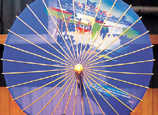
 |
| (CCTV.com) |
As word spreads that Beyonce's rendition of the US national anthem at Monday's inauguration of President Obama was pre-taped, the topic of lip-synching is on everyone's lips this week.
But Americans aren't the only ones who lip-synch. The 2008 scandal of 9-year-old Lin Miaoke miming to a pre-recording of the homelier-looking Yang Peiyi at the opening ceremony of the Beijing Olympics brought China's widely-known phenomenon of lip-synching, or faking singing in Chinese, onto the international stage. After being poked fun of by international media and criticized by domestic audiences as well, China's Ministry of Culture issued new regulations later that year, banning performers from pretending to sing or play an instrument to pre-recorded music.
Following the new regulations, actions have been made to ensure authentic performances. In 2010 two lesser-known Chinese pop singers became the first performers ordered to pay 50,000 yuan ($8,040) each after they were found to have lip-synched a 2009 performance in Southwest China's Sichuan Province. China Central Television (CCTV) also implemented a ban on pre-recorded performances for its 2010 Spring Festival Gala, the most watched show on the eve of Spring Festival, only the third time the show had been all-live since 1983 (the other two were in 1999 and 2005).
However, despite the ban, dummied performances still go largely unregulated, especially with the upcoming Chinese New Year, when song and dance performances are being held by various TV stations and organizations.
Some artists have called for more efforts to ensure real performances.
One of those artists, Zhang Hongyan, a Chinese pipa (a four-string musical instrument) player, said the primary reason that TV stations stage mimed shows is because they want to have higher quality performances that will attract higher audience ratings, like what the CCTV gala has been doing for years. Zhang was among the first artists in China to publicly denounce miming performances to pre-recorded music.
Zhang was approached by the China Federation of Literary and Art Circles last month to stage a pipa performance for its year-end gathering at the Great Hall of the People last week. She indignantly turned down the offer when she was requested to record the music in the studio weeks before the show. She denounced the action on her Sina Weibo, given the federation's function in leading China's artistic circles.
"A lot of organizers have been making the excuse of 'being responsible for the audience.' To present fake performances is surely not the way to be responsible. I would rather stage an imperfect performance than fake it on stage," said Zhang, also a professor at China's Central Conservatory of Music in Beijing.
Another reason, as observed by Xu Chunlan, a theater director of traditional Chinese xiqu performances, is because some famed singers or instrument players are being involved in too many performances. Busy shuttling back and forth to different shows, they do not spend much time perfecting their skills, making them more willing to lip-synch.
"Some are afraid they would forget the lyrics, and some might have sore throats, which is understandable," Xu said. "But I'm really against agents having their singers lip-synch just to make them a star."
Using pre-recorded music saves time and effort, and the artifice can be masked.
"When it comes to the 'live show,' the organizer can just play the CD with amplifiers for performers. Even when microphones are attached to the instrument or singer, the live sound could be easily covered up by amplifiers," Zhang said.
The mimed shows have been going on in China for 20 years and Chinese audiences seem to have come to terms with it, said Zhang. "Some believe it is the way to have quality performance."
Tougher regulations can deter musical mannequins, but the decision really comes down to artists.
"Artists always have the choice of accepting or rejecting such invitations," Zhang said. "If they are afraid they can't stage quality music, it is perhaps the time for them to spend more time perfecting their skills, or to quit the stage to allow room for more talented artists."
















 Time to stop appalling food waste on dining table. "Rich" is not defined by "waste".
Time to stop appalling food waste on dining table. "Rich" is not defined by "waste".


![]()
